Related Research Articles

The University of Pristina is a public university located in Pristina, Kosovo. It is the institution that emerged after the disestablishment of the University of Pristina (1969–1999) as a result of the Kosovo War. The inauguration of the university was a historical occurrence not only for the people of Kosovo, but for the whole Albanian nation. On 15 February, the solemn Parliament session took place, which is also proclaimed as The University of Pristina's Day. In the composition of the newly established University of Pristina were faculties with their headquarters in Pristina: the Faculty of Philosophy, Faculty of Law and Economics, Faculty of Engineering and Faculty of Medicine. Now the University of Pristina has 17 faculties, of which 14 are academic faculties and 3 are faculties of applied sciences. Contained within the emblem is a translation of the name into Latin, Universitas Studiorum Prishtiniensis.

Mehdi Bardhi was a Kosovar linguist, author, and teacher.
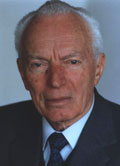
Mark Krasniqi was a Kosovar Albanian ethnographist, publicist, writer and translator who did most of his work while residing in Yugoslavia.
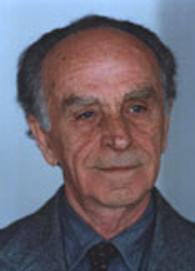
Besim Bokshi was an Albanian poet, linguist and philologist. He served as the president of the Academy of Sciences and Arts of Kosovo during 2008-2011.
Classical music in Kosovo refers to the art music cultivated in Kosovo. The roots of classical music in Kosovo are found in the 1940s and include the time period from the times when Kosovo was part of Yugoslavia to this day. It can be said that there is a tradition of classical music in Kosovo, however, compared to other Balkan countries and especially European countries this tradition is younger. Classical music in Kosovo reaches back about 70 years. Even though in a short period of time, this music has evolved, passing through generations of composers and artists. In his book Albanian: Zhvillimi i stileve në veprat e kompozitorëve shqiptarë të Kosovës, Engjëll Berisha comments:
The diversity of styles in Albanian music [of Kosovo], its national patterns with sound idea-aesthetic foundations are a characteristic of the European musical reality, so many many works are of interest abroad, too, because during this relatively short period Albanian classical music in Kosovo has compensated for the delay in its development.
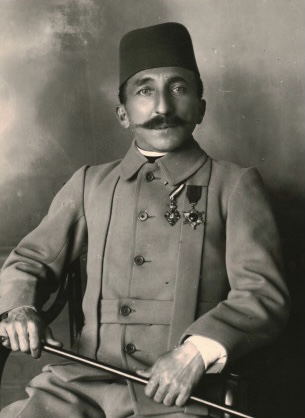
Hysni Curri (?–1925) was a Kosovar Albanian military figure and a prominent leader of the Kachak movement and the Committee for the National Defence of Kosovo.

The National Theatre of Kosovo was founded in 1946 in the city of Prizren, Kosovo. It is the highest ranked theatre institution in the country, with the largest number of productions. The National Theatre is the only public theatre in Kosovo and therefore it is financed by Ministry of Culture, Youth and Sport. This theatre has produced more than 400 premieres which have been watched by more than 3 million spectators.
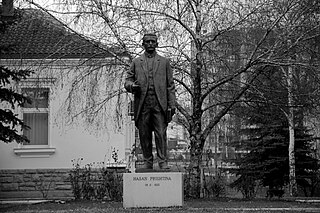
Education in Pristina, the capital of Kosovo, consists of primary, secondary and higher education. Pristina houses a number of public and private institutions, such as the University "Hasan Prishtina", the National Library of Kosovo, and the Academy of Sciences and Arts of Kosovo. Throughout the last century Pristina has attracted a considerable number of students from Kosovo. Today, the city of Pristina hosts a large number of intellectuals, professors, academics, students, and professionals in various spheres.
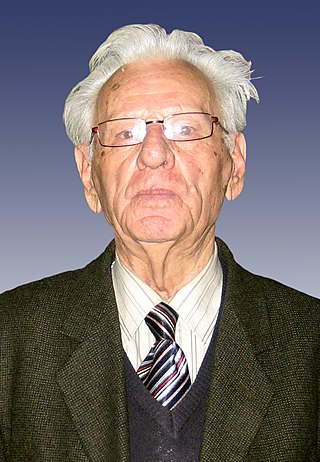
Idriz Ajeti was an Albanologist from Kosovo and one of the main researchers and authorities on the Albanian language studies of post World War II. He was involved for a long period in the academic life of the University of Pristina, and was a member of the Academy of Sciences and Arts of Kosovo, being its chairman for seven years.

Shaban Demiraj was an Albanian albanologist, linguist, professor at the University of Tirana from 1972–1990, and chairman of the Academy of Sciences of Albania during the period of 1993–1997.
The Second Congress of Manastir was an Albanian congress held on 2–3 April 1910 in Manastir, back then Ottoman Empire, today's Bitola in the Republic of North Macedonia. It dealt with the challenges that the Albanian language and schools faced at the time within the context of the empire, and the platform to overcome them.

Kosovo during the Second World War was in a very dramatic period, because different currents clashed, bringing constant tensions within it. During World War II, the region of Kosovo was split into three occupational zones: Italian, German, and Bulgarian. Partisans from Albania and Yugoslavia led the fight for Kosovo's independence from the invader and his allies. During occupation by Axis powers, Bulgarian and Albanian collaborators killed thousands of Kosovo Serbs and Montenegrins. Tens of thousands were also expelled or were placed into concentration camps.
The Capture of Pristina was a pivotal event during the Albanian revolt of 1912, it involved the entry of Albanian rebels into the former capital of the Kosovo vilayet.
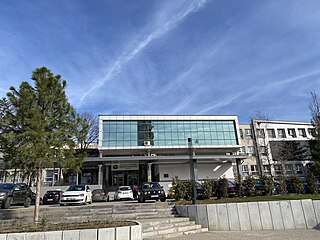
The Faculty of Philology is an academic unit within the University of Pristina. Established in 1988 after gaining independence from the Faculty of Philosophy, its roots can be traced back to the Higher Pedagogical School of Prishtina (1958) and the Faculty of Philosophy (1960).
Islam Krasniqi is a Kosovan didactician, educational theorist, and university professor.
Fadil Sulejmani was an Albanologist, university professor, and the first rector of the University of Tetova.
Hajrullah Koliqi (1946) is an Albanian educator, lecturer and university professor from Montenegro.
The Prishtina Normal School was a teachers' college in Kosovo, established on 17 December 1941, during the Italian occupation of Kosovo. It was a cornerstone in the development of the educational system in Kosovo and in the region. Initially created to address the critical need for qualified teachers in Kosovo's Albanian schools, the institution quickly became a vital academic, educational and cultural hub. Over the years, it played a significant role in training educators and fostering intellectual growth, leaving a lasting legacy through its distinguished alumni and contributions to Kosovo's educational system. Between 1946 and 1953, the school operated in Gjakova. The Prishtina Normal School ceased to exist in 1974.
Esat Stavileci was a Kosovan lawyer and professor at the Faculty of Law of the University of Prishtina.
References
- 1 2 3 Kraja, Mehmet, ed. (2018). "Fjalori Enciklopedik i Kosovës". (Encyclopedic Dictionary of Kosova) (in Albanian). Vol. 2. Prishtinë: Akademia e Shkencave dhe e Arteve e Kosovës. pp. 1202–1203. ISBN 9789951615846. OCLC 1080379844.
- 1 2 3 4 Lafe, Emil, ed. (2008). "Fjalor Enciklopedik Shqiptar". (Encyclopedic Dictionary of Albania) (in Albanian). Vol. 3. Tiranë: Akademia e Shkencave e Shqipërisë. pp. 1858–1859. ISBN 9789995610272. OCLC 426069353.
- ↑ Nushi, Pajazit (1983). Zhvillimi i terminologjisë psikologjike dhe baza semantike e përcaktimit të saj në gjuhën shqipe [Development of psychological terminology and the semantic basis of its definition in the Albanian language] (in Albanian). Prishtinë.
{{cite book}}: CS1 maint: location missing publisher (link) - ↑ Prapashtica, A. (July 31, 2013). "Pajazit Nushi (Interview)". oralhistorykosovo.org. Retrieved January 4, 2023.